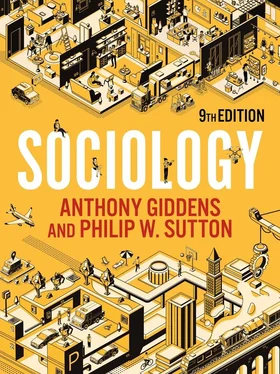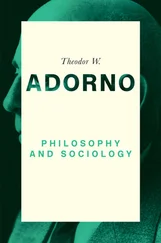Societies and sociology in transformation
For much of its history, sociology was dominated by the so-called Marx–Weber debate on the character and future of capitalist societies. For both Marx and Weber, the emergence of capitalism was a fateful development which shaped the direction of societies around the world. Marx saw capitalism as more dynamic than any preceding type of economic system. Capitalists compete to sell their goods to consumers, and, in order to survive in a competitive market, firms have to produce their wares as cheaply and efficiently as possible. This leads to constant technological innovation as companies strive to gain an edge over their rivals. Capitalist firms also seek out new markets for goods, cheap raw materials and cheaper sources of labour. For Marx, capitalism is a restlessly expanding system spreading to all parts of the globe.
Max Weber is one of Marx’s most perceptive critics, and his work has been described as involving a lifelong struggle with ‘the ghost of Marx’ – the intellectual legacy Marx left behind. Weber agreed that economic factors played a crucial role in social change, but non-economic factors, such as ideas and ideologies, also played their part. For example, Weber argued (as did Marx) that material interests are the main driving force in history, but for Weber these interests are channelled in particular directions by ideas, which act rather like the ‘switchmen’ who direct powerful trains at railway junctions. Weber’s understanding of modern societies and their direction of travel contrasts sharply with that of Marx.
USING YOUR SOCIOLOGICAL IMAGINATION
3.1 Marx and Weber – the shaping of the modern world
| Broadly Marxist ideas |
Broadly Weberian ideas |
| 1 The main dynamic of modern development is the expansion of capitalistic economic mechanisms. |
1 The main dynamic of modern development is the rationalization of production. |
| 2 Modern societies are riven with class inequalities, which are basic to their very nature. |
2 Class is one type of inequality among many – such as inequalities between men and women – in modern societies. |
| 3 Major divisions of power, such as those affecting the differential position of men and women, derive ultimately from economic inequalities. |
3 Power in the economic system is separable from other sources. For instance, male–female inequalities cannot be explained in economic terms. |
| 4 Modern societies (capitalist societies) are a transitional type – we may expect them to become radically reorganized in the future. Socialism will eventually replace capitalism. |
4 Rationalization is bound to progress further in the future, in all spheres of social life. All modern societies are dependent on the same basic modes of social and economic organization. |
| 5 The spread of Western influence across the world is mainly a result of the expansionist tendencies of capitalist enterprise. |
5 The global impact of the West comes from its command over industrial resources, together with superior military power. |
Are the key ideas of Marx and Weber really incompatible? Using the table above, see if you can put together an argument that says they have more in common than that which divides them.
According to Weber, capitalism is just one aspect of social development, and in some ways the impact of science and bureaucracy has been more important. Science has shaped modern technology and would continue to do so in any future socialist society, while bureaucracy remains the most efficient way of organizing large numbers of people effectively. Bureaucracies inevitably expand with modern life, becoming a key source of rationalization – the organization of social and economic life according to principles of efficiency on the basis of technical knowledge (see ‘Global society’ 3.1 below). Weber also suggests, against Marx, that capitalism actually provides a counterbalancing source of creativity to the stultifying ‘dead hand’ of bureaucratic domination.
Which interpretation of social change is correct? Perhaps today this is not the most pressing question. The classical theories of Marx, Durkheim and Weber and their later incarnations may not be the best guides to contemporary issues of shifting gender relations, multicultural societies, globalization, technological development and accelerating climate change. Do we now need new theories that move beyond the classics, perhaps taking sociology in different directions?
Global society 3.1 Rationalization as McDonaldization?
Anyone who has eaten at a McDonald’s restaurant abroad as well as at home will have noticed many similarities. The interior decorations may vary, the language spoken will differ, but the layout, the procedure for ordering, staff uniforms, and ‘service with a smile’ are essentially similar. Compared with many other restaurants, one of the obvious differences at McDonald’s is just how efficient the whole process is. Staff members work on specialized, straightforward jobs: one makes the fries, another flips the burgers, a third puts the burger in a bun and adds the salad. Much of the process is also automated – milkshakes at the press of a button, deep fryers that work at set temperatures, and tills with buttons for each item so staff do not even have to learn food prices.
But why should sociologists be interested in fast food? George Ritzer (1983, 1993, 1998) argues that McDonald’s provides a vivid metaphor of recent economic and cultural transformations. What we are witnessing, he says, is the ‘McDonaldization’ of society: the process by which the basic principles of fast-food restaurants come to dominate other areas of society. Using the four guiding principles of McDonald’s restaurants – efficiency, calculability, uniformity and control through automation – Ritzer argues that modern societies are becoming ever more ‘rationalized’ and that McDonald’s is simply the best exemplar of the process. ‘McDonaldization’, he notes, is catchier than ‘Burger Kingization’ or ‘Starbuckization’.
Like Weber, Ritzer claims that the long-term process of rationalization can, paradoxically, generate irrational outcomes. Weber saw that bureaucracies take on a life of their own, spreading through social life with harmful as well as positive consequences. Similarly, Ritzer argues that the apparently rational process of McDonaldization spawns a series of irrationalities – damage to our health, from a ‘high calorie, fat, cholesterol, salt, and sugar content’ diet, and to the environment, with all the packaging that is thrown away after each meal. Most of all, McDonaldization is ‘dehumanizing’. People file forward in queues as if on a conveyer belt, while staff repeat the same tasks over and over again, like robots.
Ritzer’s thesis has been very influential in sociology, though in recent years McDonald’s has been forced to change its practices to compete in the global economy, tailoring its ‘product’ to fit the local cultures in particular markets around the world – an excellent example of glocalization in practice.
Reflexivity, risk and cosmopolitan theory
The ideas of the classical thinkers – Marx, Durkheim and Weber – were formed during times of great social, political and economic change, which their perspectives sought to understand. Arguably, we are living through a period of global transformation that is just as profound, yet more widely felt across more regions of the world. The need to refresh and update our theoretical perspectives seems increasingly necessary if sociology is to remain relevant. The theory of globalization is discussed extensively in chapter 4, and we will not anticipate that discussion here. Instead, we look at three significant theories which assume that globalization is transforming human societies. These are selected as representative of sociologists who reject the postmodern idea of the death of modernity.
Читать дальше












